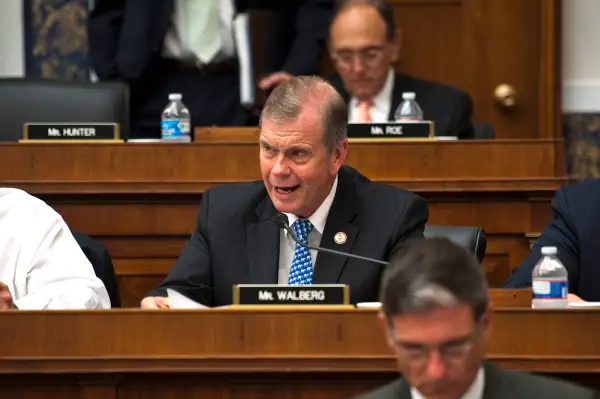Two Congressmen Are Trying to Kill a Program That Helps People Save for Retirement

One of the best ways to help people save money for retirement may soon be blocked by Congress.
This week, two Republican Congressmen introduced bills that would effectively prevent states and cities from setting up automatic retirement programs for small business workers. UPDATE: They were passed by the House on Wednesday.
More than 30 states are in various stages of developing these savings plans, according to the Georgetown Center for Retirement Initiatives. The basic approach is to require any business that doesn't offer retirement plans to auto-enroll workers in an IRA account, with contributions funneled from their paychecks into the investment vehicle. An IRA is a tax-advantaged retirement account. The worker may also choose to opt out.
These programs have been hailed by retirement experts as a great way to get more Americans to save. Only about half of U.S. private sector workers are covered by a 401(k) or similar retirement plan, leaving the rest, some 55 million Americans, without access to a workplace program. And without the nudge from an employer plan, most people fail to save—some 90% of those with a workplace plan save, vs. just 20% without one. Those who are left out tend to be lower-income and minority workers.
Seven states—including California, Illinois, and Maryland—have already enacted the policy. Oregon's plan is scheduled to launch later this year. A few cities, including New York and Philadelphia, are also considering similar programs.
Republicans are seeking derail these initiatives through a rarely-used legislative maneuver called a Congressional Review Act (CRA) joint resolution of disapproval. This strategy can be used to undo regulations before 60 legislative days have gone by since they were published in the Federal Register. The two Republican-sponsored House resolutions take aim at U.S. Department of Labor rules designed to speed the adoption of state- and city-sponsored retirement savings plans.
“A CRA resolution can be a very effective tactic, since it can be passed by Congress with a simple majority and cannot be filibustered,” says Amit Narang, a regulatory policy advocate at Public Citizen's Congress Watch. Once a CRA is passed, the agency that issued the blocked ruling cannot pass a substantially similar rule in the future unless it is reauthorized by Congress. In the case of auto-IRA plans, Congress has until mid-May to mid-June to act.
One resolution, sponsored by Rep. Tim Walberg (R.-Mich.), would block the Labor Department rule for state saving plans. Another, which would block it for cities, is sponsored by Rep. Francis Rooney, R.-Fla. In their statement, the Congressmen argue that, among other things, cutting the automatic savings programs would "reduce costly red tape."
“This last-minute regulatory loophole created by the previous administration will lead to harmful consequences for both workers and employers,” Rep. Rooney said. “Hardworking Americans could be forced into government-run plans with fewer protections and less control over their hard-earned savings. Employers will face a confusing patchwork of rules, and many small businesses may forgo offering retirement plans altogether. Congress must act to protect workers and small businesses from these misguided regulations.”
“Our nation faces difficult retirement challenges, but more government isn’t the solution,” Rep. Walberg said.
That’s not how many state officials and retirement experts see it.
“It's just really disappointing that Congress is making it more difficult for people to save when we have a tidal wave of retirements coming at us,” says Oregon State Treasurer Tobias Read, a Democrat. "Every dollar not saved now will put more pressure on state budgets and public services in the future."
There's also plenty of evidence that many Americans would welcome state retirement plan options. A new survey from the National Institute on Retirement Security shows that 75% of Americans support the notion of state retirement plans. "These programs have strong bipartisan approval," says NIRS president Diane Oakley, who notes that 72% of Republicans and 83% of Democrats say state retirement savings plans are a good idea.
State plans are also favored by small business owners, says John Scott, director of the retirement savings project at the Pew Charitable Trusts. A 2016 Pew survey found that 80% of small business owners said they supported the basic concept of an auto-IRA program.
Given the turmoil in Washington these days, it’s hard to predict how much traction these bills will get. “More than 30 other CRAs seeking to block the last administration’s rules have been introduced so far, and it’s not clear how much a priority this one will be given,” says Narang. Still, Congress may get pressure on state plans from some financial services firms that market to small business 401(k)s seeking to block competition, says Scott.
Retirement advocate groups are gearing up for a lobbying battle. "Many people on the Hill aren't familiar with state plans, and don't understand that they have a long history of support from both parties," says Cristina Martin Firvida, director of financial security for AARP.
Even if the bills pass, states that have already enacted retirement savings plans may go forward anyway. “There’s already an exception for state savings plans, but the Labor Department rule provided additional clarification,” says Scott. Oregon Treasurer Read says his state plan is still on track to start rolling out in July. Still, the legislation would create a cloud of uncertainty that may slow further development of state and city plans. That will leave workers without employer plans on the wrong side of the retirement inequality gap.
